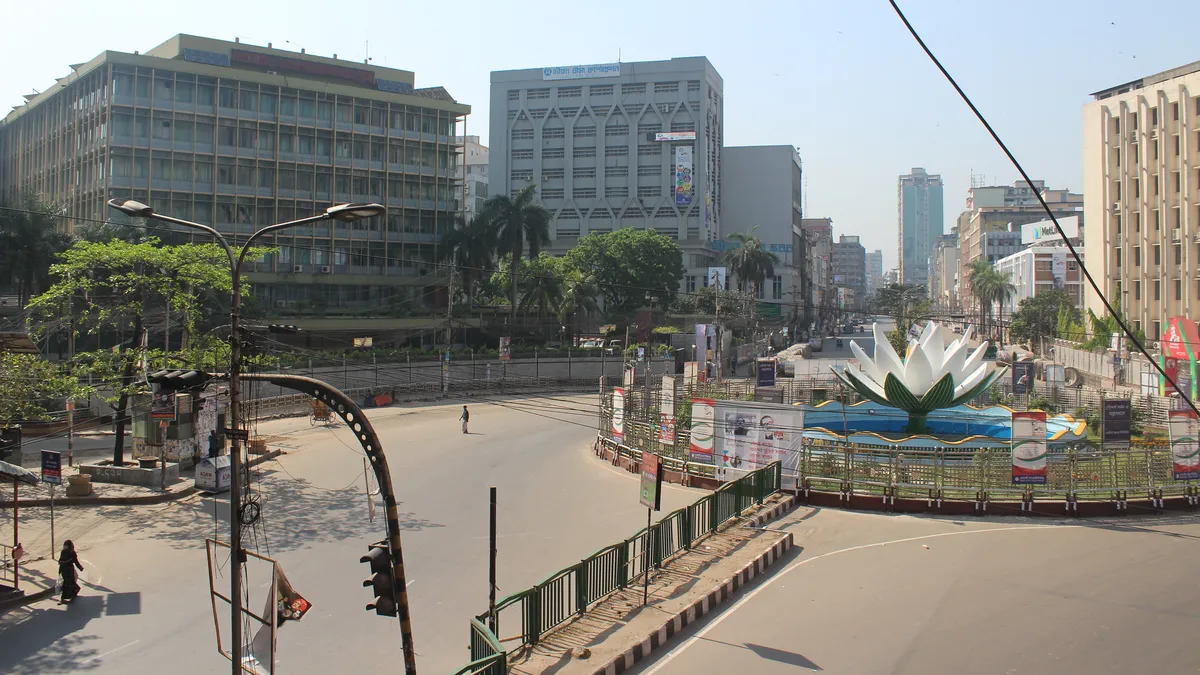UPDATE: July 8, 2021: Bangladesh extended its lockdown for seven more days to July 14, as death tolls from COVID-19 hit record highs. More than 100 people have died each day in July so far, according to the Dhaka Tribune, and on Wednesday the death toll reached its highest rate since the start of the pandemic. Factories will remain open, according to Reuters.
Dive Brief:
- A rapid rise in COVID-19 infections linked to the delta variant of the virus led the Bangladesh government to call for a weeklong lockdown across the country to abate spread of the disease.
- "While primarily a human tragedy, the renewed spread and resulting lockdown will also have an impact on industrial supply chains as factories will likely have to close and may suffer reduced productivity," Christopher Rogers, a senior researcher at Panjiva, wrote in an S&P Global Market Intelligence update.
- The government of Bangladesh gave garment factories a special exclusion from the "hard lockdown" that will allow them to stay open, according to the Dhaka Tribune. But the lockdown may yet decrease productivity as public transit will be limited, making it difficult for workers to arrive at factories.
Dive Insight:
Garment factories in Bangladesh and the apparel brands that rely on them were hard hit over the past year, as rises in COVID-19 infections linked to the alpha variant led to prolonged lockdowns in 2020.
Factories were closed for nearly a month during the first lockdown in Bangladesh, which began in March 2020 and did not end until May 3. The closures led to significant economic damage, according to the Bangladesh Garment Manufacturers & Exporters Association.
"With the immediate impact of COVID-19, 1150 of factories reported US$ 3.18 billion worth of order cancellations, and since four months of post COVID we have lost US$ 4.9 billion worth of apparel," the association wrote in a July 2020 statement.
Canceling orders was a predominant strategy used by fashion brands last year as companies prepared for a potential cash crunch from declining sales revenue. Buyers in the U.S. and European Union canceled at least $16.2 billion worth of apparel orders from April to June 2020, according to an October 2020 report from the Workers Right Consortium and Penn State Center for Global Workers' Rights.
But the cancellations disproportionately affected manufacturers in Bangladesh, which exports the third-most apparel products to the U.S., according to data from the U.S. Department of Commerce.

The economic toll of the first lockdown led the garment industry to seek out strategies that could allow it to retain production during future lockdowns. Industry groups pleaded with retailers to pay for canceled orders, and sought to keep factories open at limited capacity after the initial month-long lockdown.
Data from Panjiva suggests the strategy worked, to a degree. Rogers wrote that apparel exporters in Bangladesh "remained more resilient than peers during the pandemic," as exports to the U.S. from Bangladesh decreased just 1.6% YoY in the first quarter of 2020, compared to drops of 10.1% and 6.4% in India and Sri Lanka, respectively.
But in recent weeks, the rapid surge in COVID-19 infections linked to the delta variant led the Bangladesh government to call for a full weeklong lockdown again.
At first, it seemed factories would close too — and garment industry leaders were outspoken in opposition.
"If the factories close again, exports would go down again like last year," Mohammad Hatem, vice-president of the Bangladesh Knitwear Manufacturers and Exporters Association told Dhaka Tribune. "There is also pressure from buyers to ship the finished products on time. Our work orders increased recently, but if our factories shut down, all our efforts to increase those orders would go down the drain."
The news led Rogers to publish the S&P Global Market Intelligence note, warning of potential supply disruptions for brands like H&M and Levi Strauss. (H&M and Levi Strauss declined to comment on potential disruptions.)
Dhaka Tribune later reported the government of Bangladesh had granted an exemption to garment factories to continue operations despite the country-wide lockdown. However, as public transport would be limited, workers would have to walk.
"Only those who live in close proximity to the factories will be able to come to work," said BGMEA President Faruque Hassan, according to Dhaka Tribune. "We want to implement the government's plan. At the same time, we want our factories to continue production even if on a limited scale."
Kalpona Akter, president of the Bangladesh Garment & Industrial Workers Federation, said as of Thursday morning, workers living near the factories are arriving at a regular time, but workers who live far away are in a more difficult situation.
"We have checked with many [factory workers] who informed us that their employers haven't provided any transport," Akter said in an email. As a result, many workers are using whatever means they can to arrive at the factories, because they perceive a "high possibility to losing their pay or some cases jobs" if they do not arrive.















